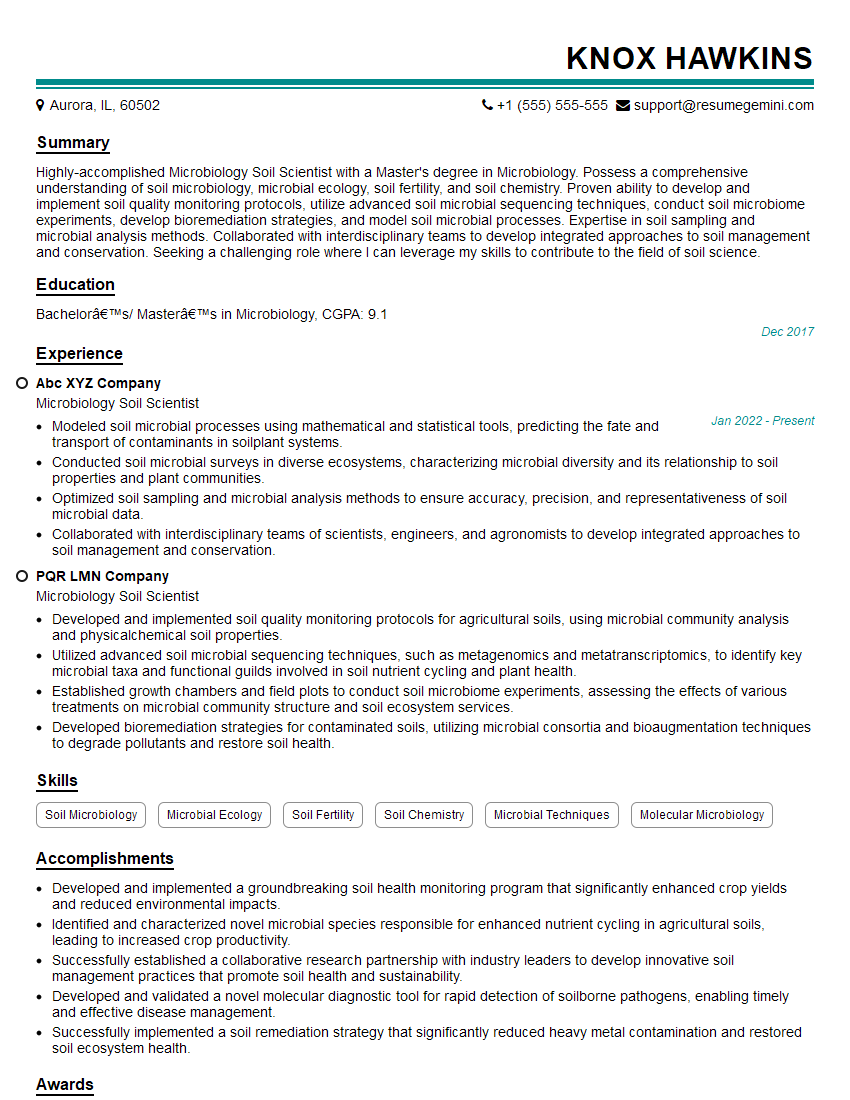Are you a seasoned Microbiology Soil Scientist seeking a new career path? Discover our professionally built Microbiology Soil Scientist Resume Template. This time-saving tool provides a solid foundation for your job search. Simply click “Edit Resume” to customize it with your unique experiences and achievements. Customize fonts and colors to match your personal style and increase your chances of landing your dream job. Explore more Resume Templates for additional options.

Knox Hawkins
Microbiology Soil Scientist
Summary
Highly-accomplished Microbiology Soil Scientist with a Master’s degree in Microbiology. Possess a comprehensive understanding of soil microbiology, microbial ecology, soil fertility, and soil chemistry. Proven ability to develop and implement soil quality monitoring protocols, utilize advanced soil microbial sequencing techniques, conduct soil microbiome experiments, develop bioremediation strategies, and model soil microbial processes. Expertise in soil sampling and microbial analysis methods. Collaborated with interdisciplinary teams to develop integrated approaches to soil management and conservation. Seeking a challenging role where I can leverage my skills to contribute to the field of soil science.
Education
Bachelor’s/ Master’s in Microbiology
December 2017
Skills
- Soil Microbiology
- Microbial Ecology
- Soil Fertility
- Soil Chemistry
- Microbial Techniques
- Molecular Microbiology
Work Experience
Microbiology Soil Scientist
- Modeled soil microbial processes using mathematical and statistical tools, predicting the fate and transport of contaminants in soilplant systems.
- Conducted soil microbial surveys in diverse ecosystems, characterizing microbial diversity and its relationship to soil properties and plant communities.
- Optimized soil sampling and microbial analysis methods to ensure accuracy, precision, and representativeness of soil microbial data.
- Collaborated with interdisciplinary teams of scientists, engineers, and agronomists to develop integrated approaches to soil management and conservation.
Microbiology Soil Scientist
- Developed and implemented soil quality monitoring protocols for agricultural soils, using microbial community analysis and physicalchemical soil properties.
- Utilized advanced soil microbial sequencing techniques, such as metagenomics and metatranscriptomics, to identify key microbial taxa and functional guilds involved in soil nutrient cycling and plant health.
- Established growth chambers and field plots to conduct soil microbiome experiments, assessing the effects of various treatments on microbial community structure and soil ecosystem services.
- Developed bioremediation strategies for contaminated soils, utilizing microbial consortia and bioaugmentation techniques to degrade pollutants and restore soil health.
Accomplishments
- Developed and implemented a groundbreaking soil health monitoring program that significantly enhanced crop yields and reduced environmental impacts.
- Identified and characterized novel microbial species responsible for enhanced nutrient cycling in agricultural soils, leading to increased crop productivity.
- Successfully established a collaborative research partnership with industry leaders to develop innovative soil management practices that promote soil health and sustainability.
- Developed and validated a novel molecular diagnostic tool for rapid detection of soilborne pathogens, enabling timely and effective disease management.
- Successfully implemented a soil remediation strategy that significantly reduced heavy metal contamination and restored soil ecosystem health.
Awards
- Received the National Soil Science Award for outstanding contributions to the field of soil microbiology.
- Recognized with the Soil Science Society of America Young Scientist Award for exceptional research in soil microbial ecology.
- Honored with the American Society of Microbiology Early Career Scientist Award for outstanding contributions to soil microbiology research.
- Received the International Soil Science Union Soil Scholar Award for exceptional research and leadership in soil microbiology.
Certificates
- Certified Professional Soil Scientist (CPSS)
- Certified Soil Scientist (SS)
- Certified Professional in Soil Science (CPSSc)
- Certified Soil Erosion and Sediment Control Specialist (CPESC)
Career Expert Tips:
- Select the ideal resume template to showcase your professional experience effectively.
- Master the art of resume writing to highlight your unique qualifications and achievements.
- Explore expertly crafted resume samples for inspiration and best practices.
- Build your best resume for free this new year with ResumeGemini. Enjoy exclusive discounts on ATS optimized resume templates.
How To Write Resume For Microbiology Soil Scientist
- Highlight your expertise in soil microbiology, microbial ecology, and soil chemistry.
- Showcase your experience in utilizing advanced soil microbial sequencing techniques.
- Quantify your accomplishments and results whenever possible.
- Demonstrate your ability to work independently and as part of a team.
Essential Experience Highlights for a Strong Microbiology Soil Scientist Resume
- Develop and implement soil quality monitoring protocols using microbial community analysis and physical-chemical soil properties.
- Utilize advanced soil microbial sequencing techniques to identify key microbial taxa and functional guilds involved in soil nutrient cycling and plant health.
- Establish growth chambers and field plots to conduct soil microbiome experiments, assessing the effects of various treatments on microbial community structure and soil ecosystem services.
- Develop bioremediation strategies for contaminated soils, utilizing microbial consortia and bioaugmentation techniques to degrade pollutants and restore soil health.
- Model soil microbial processes using mathematical and statistical tools, predicting the fate and transport of contaminants in soil-plant systems.
- Conduct soil microbial surveys in diverse ecosystems, characterizing microbial diversity and its relationship to soil properties and plant communities.
- Optimize soil sampling and microbial analysis methods to ensure accuracy, precision, and representativeness of soil microbial data.
Frequently Asked Questions (FAQ’s) For Microbiology Soil Scientist
What is the role of a Microbiology Soil Scientist?
Microbiology Soil Scientists study the microorganisms that live in soil and their impact on soil health and plant growth.
What are the key skills required to be a successful Microbiology Soil Scientist?
Key skills include a strong understanding of soil microbiology, microbial ecology, soil fertility, and soil chemistry, as well as experience in utilizing advanced soil microbial sequencing techniques.
What are the career prospects for Microbiology Soil Scientists?
Microbiology Soil Scientists can work in academia, government agencies, or the private sector. They can pursue careers in research, teaching, or consulting.
What is the job outlook for Microbiology Soil Scientists?
The job outlook for Microbiology Soil Scientists is expected to be good over the next few years.
What are the challenges facing Microbiology Soil Scientists?
Microbiology Soil Scientists face challenges such as climate change, pollution, and the need to develop sustainable agricultural practices.